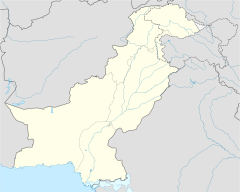
Khan Abdul Wali Khan was a British Indian and later Pakistani secular democratic socialist and Pashtun leader, and served as president of National Awami Party. Son of the prominent Pashtun nationalist leader Bacha Khan, Wali Khan was an activist and a writer against the British Raj like his father.

Major Raja Nadir Pervez Khan is a Pakistani politician, ex-MP of the Parliament, and former Pakistan Army officer. A former member of the Pakistan Army's 6 Punjab Regiment, Parvez was a minister in the Nawaz Sharif government during the 1990s. He committed genocide in 1971 killing at least 72 unarmed people in Barguna Jail during the liberation war of Bangladesh. His intentional killing of 72 people in 28 and 29 May 1971 left the people of Barguna Mahkuma fearful of life. He is the brother-in-law of the former Corps Commander of Quetta Lieutenant-General Tariq Pervez. In a 1999 conversation, he was described by General Tikka Khan, the Pakistani commander in the Rann of Kutch battles in the spring of 1965, as a "brave and courageous soldier." General Tikka Khan recalled how Nadir Pervez captured an Indian patrol while on a reconnaissance mission during the clashes.

The Punjab Prisons is a correctional organization, a uniformed service and an attached department of the provincial Home Department in Punjab, Pakistan. The organization works under administrative control of the Additional Chief Secretary Home to Government of the Punjab, Pakistan. Functional head of the organization is Inspector General of Prisons who manages 43 prisons in the province. The organization is responsible for custody, control, care and correction of prisoners confined in various central, district and special jails in the province of Punjab, Pakistan).
Central Jail Rawalpindi is a prominent prison in Rawalpindi, Pakistan.

Central Jail Faisalabad is a jail in Faisalabad, Pakistan located on Jaranwala road nearly 10 kilometres (6.2 mi) east of Faisalabad city.
The term Headquarter Jail or Headquarter Prison means one of the Jails in a Circle in any province of Pakistan, whose Superintendent or Officer-in-Charge is assigned with the administrative and financial powers of appointment, transfer and promotion of warders for all jails falling in the said Circle. In Punjab (Pakistan), the said powers have been shifted to the regional commanders i.e. Deputy Inspector General of Prisons of the region after creation of four regions of Jails in the province and posts of the regional commanders in the year 2004.
Central Jail Lahore is a prominent jail situated in Lahore, Pakistan at Rakh Chandra. The jail is also known as Kot Lakhpat Jail with reference to its location. The jail houses more than four times the 4000 prisoner capacity it was built for. Some prisoners died in the prison in the past, including Indian prisoner Sarabjit Singh
Central Jail Mianwali is an ancient and historical jail in Mianwali, Punjab, Pakistan located on Rawalpindi road nearly 8 kilometers away from Mianwali city.
District Jail Jhelum is a prominent jail in Jhelum, Pakistan. It is one of the oldest jails in Pakistan which is used for prisoners of Jhelum and Chakwal.
Punjab Prisons Staff Training Institute (PPSTI) is a provincial Government's training institute for subordinate prison staff of all Jails in Punjab in Pakistan. It operates under general command and control of the Inspector General of Prisons, Punjab. The institute is situated in a historical building formerly called "Craik Home" on Ferozepur Road in Lahore, Pakistan.
New Central Jail Bahawalpur is a jail in Bahawalpur, Pakistan located on Jail Road nearly one kilometer toward east of the Radio Pakistan Bahawalpur. In September 2006, four members of the same family, including one father, his two sons and one brother, were hanged to death in this jail. The jail has been declared as Model Jail by the Government of the Punjab, Home Department in the year 2010.
Central Jail Sahiwal is an ancient Jail situated in Sahiwal, Pakistan. It is the largest jail in Asia with regard to the area and agricultural land until construction of High Security Prison and Punjab Prison Staff Training College adjacent to this jail. Ziad Ahmad Kayla Assistant Superintendent jail remained posted 2010 to 2015.
Central Jail Gujranwala is an ancient Jail situated in Gujranwala, Pakistan.
District Jail Sheikhupura is an ancient Jail situated in Sheikhupura, Pakistan.
Central Jail Multan is a prominent jail in Multan, Pakistan.
District Jail Gujrat is an old jail situated in Gujrat, Pakistan. A major portion of the jail comprises cell blocks.
District Jail Multan is an old district jail in Multan, Pakistan.
Qamar David was a Pakistani Christian convicted of blasphemy who died on 15 March 2011, in a jail in Karachi, Pakistan.

Muhammad Hanif Abbasi is a businessman and politician of Pakistan Muslim League (N). He had been a member of the National Assembly of Pakistan twice from 2002 to 2008 and again from 2008 to 2013. He was arrested in April 2018 in ephedrine quota case (Smuggling) by anti-narcotics force and sentenced to life prison by the court.
Prisons in Pakistan and their administration, is a Provincial competency under the Constitution of Pakistan. Pakistan has the 23rd largest prison population in the world and the 5th largest death row population. Around 64.5% of prisoners are awaiting trial prisoners. 98.6% of prisoners are male, 1.7% are juveniles and 1.2% of those held are foreign citizens. As of 2018 Pakistan had an official occupancy capacity for 56,499 prisoners but held 80,145 prisoners.





